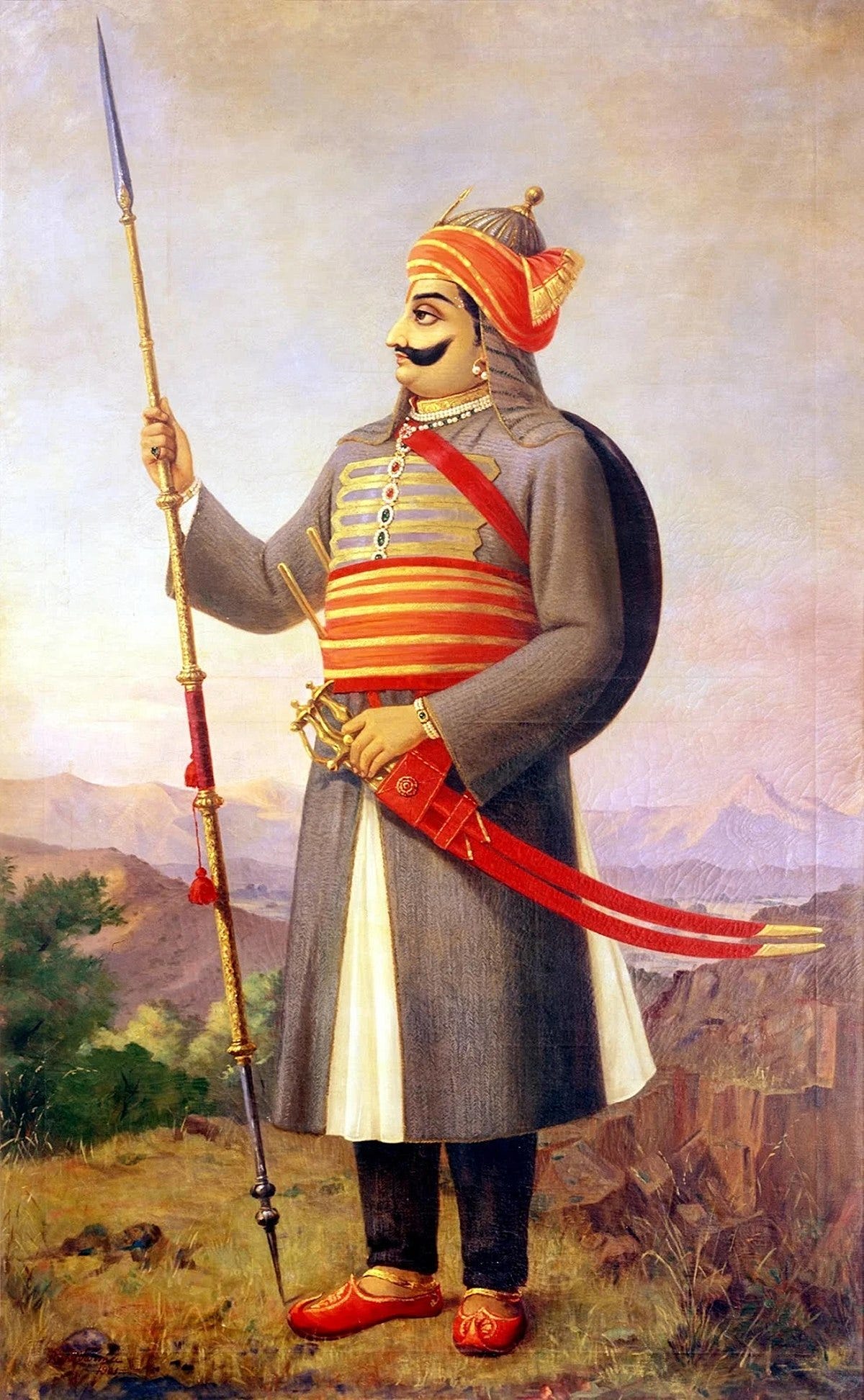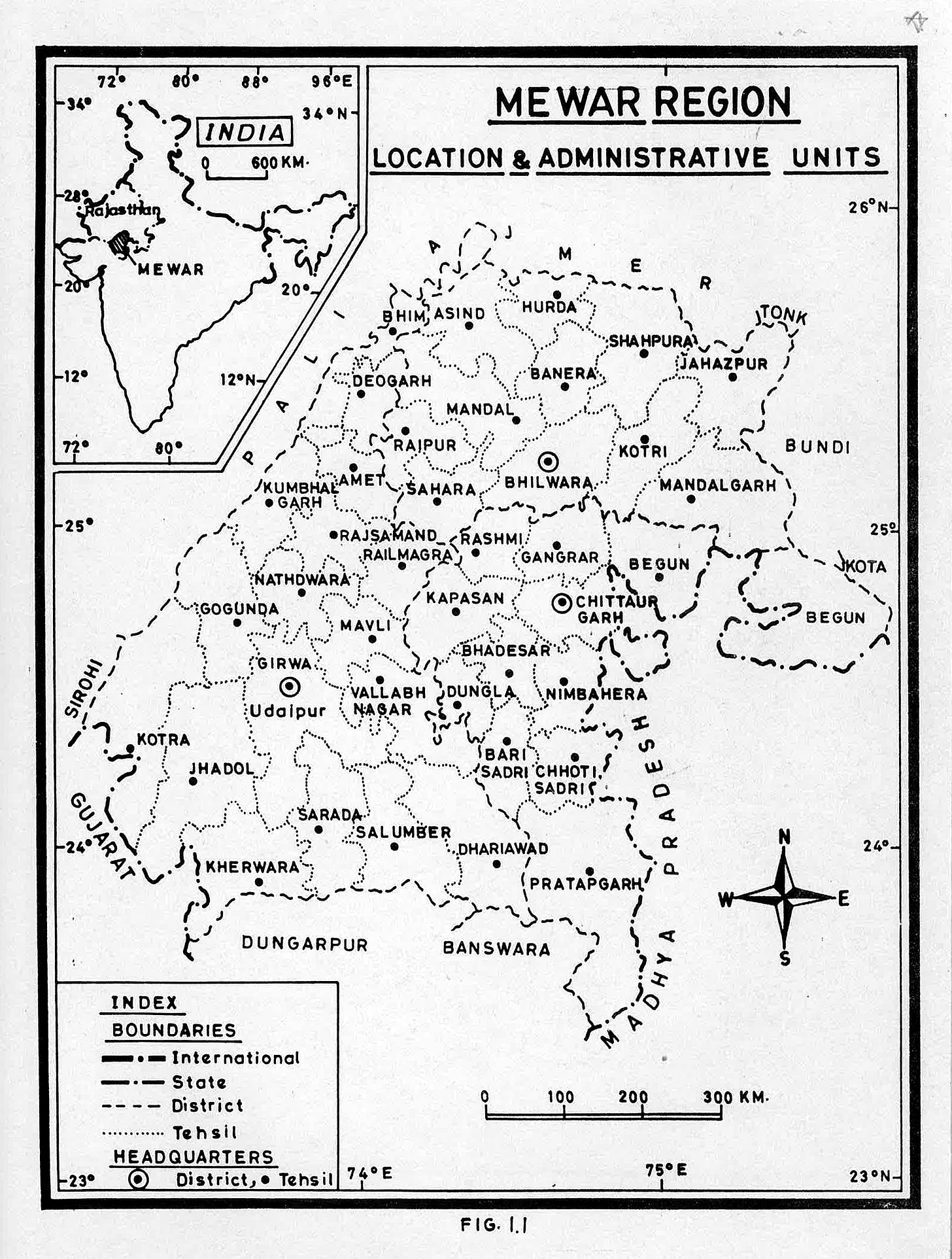Revisiting Haldighati: Examining the claims of the Maharana's defeat
This article is a part of a series on often overlooked facets of mediaeval Rajput history. Here we scrutinise the claim of Maharana Pratap's defeat in the Battle of Haldighati.
The land of Rajasthan has been a witness to innumerable wars and battles. It has seen kingdoms rise and fall, heroes etching forever their names in history with acts of valour unseen anywhere else. Despite all this, there is a battle, and there is a king, that stand out whenever the history of India is discussed. It's the battle of Haldighati and the king is none other than Maharana Pratap Singh.
The Battle of Haldighati is among the most well-known battles of Indian military history. A lot of people have interpreted it to reach conclusions they like. Some see it as an epic Hindu-Muslim clash where Maharana Pratap fought for Hindu honour, while others reject this view and see it as merely another battle in the quest for power and others in yet more peculiar ways. This ideological tug of war has led to several myths being propagated about this unforgettable incident, some intentionally. This articles seeks to bust one such myth, the biggest of them all and a very dangerous one.
Much has been said about the battle itself so that will not be the focus of this article. This article will deal with the myth that Maharana Pratap lost the battle of Haldighati and, humiliated, he had to retreat from his own territory. But first, let's look at what some of our 'eminent historians' have to say-
“In fact all heroes --- from Pratap to Prithviraj Chauhan --- that the RSS is projecting had lost conclusively. By twisting facts one cannot rewrite history.” ~D.N. Jha, former member of the Indian Council for Historical Research
"That Akbar defeated Rana Pratap is a fact of history..." ~Tanuja Kothiyal
"...if there was any winner in Haldighati, it was the Mughal army..." ~Reema Ahuja
Prof.KG Sharma says, “Initially the Rajputs were overpowering in the war but then somebody spread the rumour that Akbar himself had arrived with a large contingent. The rumour caused Maharana Pratap and his men to retreat into the hills.”
Such statements make it clear that the academia more or less unanimously agrees that Maharana Pratap lost the battle and had to retreat to the hills. That Maharana Pratap retreated from the battlefield of Haldighati is the prevailing consensus today, but there's a twist. It must be noted that it had already been decided before the battle that if the main Generals signalled the Maharana to retreat to safety, he would move back and not sacrifice himself needlessly. Also, it was a rumour that Akbar had arrived with more troops that made the Maharana retreat back from a battle he was winning.
While discussing this topic, the primary arguments from those who claim that the Mughals emerged victorious are that why did the Mughal forces continue to stay in Mewar if they lost? And that after the battle of Haldighati the Mughals captured Gogunda and Chittor and never recovered them back, Kumbhalgarh fell soon after. In reality Pratap had recaptured almost all of Mewar except regions like Chittor and Mandalgarh, including Gogunda.
(Note- After the failure in Haldighati to kill or arrest Maharana Pratap, Akbar was furious. He himself came to Mewar in November 1576 and captured important sites like Gogunda and Udaipur. Akbar stayed in Mewar in the search of Maharana Pratap for many months but had to return empty-handed in May 1577. Maharana Pratap quickly started invading and recapturing those important posts that had earlier fallen to Akbar, including Gogunda.
The popular myth, often propagated by even the media, that Maharana Pratap lost Gogunda forever is thus false.)
On the other hand, the other side argues that the Maharana succeeded in saving Mewar from falling into the hands of Mughals and thus Maharana Pratap won the battle. Author Chandra Shekar Sharma quotes both Indian and Persian sources to argue that the battle was won by Pratap.
New evidence even suggests that Pratap did not retreat. "The war was won by Pratap, which is evident from the discovery of copper plates referring to how the Rajput warrior had been allotting land and taking administrative decisions in Mewar after the battle." says Chandra Shekhar Sharma. Numerous such copper plates post the battle of Haldighati have been found which disapprove of the theory of Maharana Pratap retreating. We will talk about few such copper plates later in this article.
Even if we overlook this as an 'ahistorical and negationist reading of history', there still are many facts and questions that arise that must be answered by those who claim that Maharana Pratap lost the battle of Haldighati. Some things to think about-
1) The numbers vary from a few hundred to many thousands but usually it's agreed that the Mughals outnumbered by 4:1, or if not that then at least 2-3 times. Even in such conditions, Pratap had managed to inflict a mortality rate of 2:1 in the favour of Mewar.
2) Apart from the respect that Raja Man Singh had for Maharana Pratap, it was also the thorough decimation of the Mughal forces that stopped them from chasing Pratap even a few hundred metres into the hills.
3) The objective of the Mughal forces, as clearly directed by Akbar himself, was to either kill or take Maharana Pratap captive. They failed at both. In fact, both Asif Khan and Man Singh were demoted and reduced to the 'dyodhi'(doorstep) of Akbar as a punishment.
4) Though Mewar lost many important Generals that day, the Mughals could not capture any of them, nor could they obtain any treasure or weapon except Ramprasad, a war elephant.
5) In November 1576, Akbar himself came to Mewar with a much larger force. If Maharana Pratap had lost, then what was Akbar doing in Mewar within six months of the battle of Haldighati?
6) Land revenue records are one of the most trustworthy sources of historical evidence. Three copper letters issued by Bhama Shah on behalf of Pratap have been found with their owners in Sathana, Peepli and Mohi villages between August and September of 1576. If Pratap had lost Haldighati, how was he issuing jagirs to his men?
7) An often overlooked incident is Man singh's pursuit of Maharana Pratap on the very next day after the battle of Haldighati. Man singh's forces killed the twenty defendants. This was exactly what was planned by Pratap and his counsels post-Haldighati. They blocked all routes of Gogunda and Man singh, along with his forces, was trapped inside the forest without food and water. For months, Man singh remained at Gogunda. Hundreds of his soldiers Haldighati perished of hunger and disease.
These facts make us strongly question the current consensus that Pratap lost the battle of Haldighati.
We must also look at what the Maharana gained from it. Apart from above mentioned failures of the Mughals, the battle of Haldighati also brought many achievements to Pratap. Let's look at how Maharana Pratap benefited-
1) Pratap was able to send a clear message to Akbar, to the Mughal Generals and most importantly to his own aristocrats and people that he won't bow no matter what.
2) Pratap was able to assess and learn the tactics, strength and resolve of the Mughals. This was his first frontal combat with the Mughals.
3) Maharana Pratap decided to fight guerrilla warfare which suited the geography of Mewar, instead of fighting pitched battles.
4) Pratap's name and fame travelled far and wide across Rajasthan. Even the kings who were subservient to Akbar now talked of Maharana Pratap as a challenge to Mughal power. Many small chieftains now gravitated towards him.
5) Both Akbar and Pratap now understood that the Mughals had no answer to Mewar's mountain warfare. It was through the safety of the Aravallis that Sisodia power was to be consolidated and directed. This had a psychological impact. Mughal soldiers could now be attacked at any moment from the hills.
6) The battle exemplifies the spirit of resistance to foreign domination and has had a profound impact, inspiring subsequent rebellions against Mughal power which went on to distract and force them to move their attention away from Mewar. Maharana Pratap cleverly used the opportunities to regain much of his lost territories.
7) After Haldighati, the rulers of Banswara, Dungarpur, Sirohi, Jalore and Idar entered into friendly alliances with Mewar.
It's clear that although Haldighati led to some short terms setbacks for Pratap, like the death of many important Generals, the loss of resources, soldiers and animals and his army getting scattered, overall his gains far outweighed his losses and he went on to continue the struggle for decades to come. Considering all this, the battle of Haldighati can be called a victory for Pratap, both in the short term and in the long term, or at worst, a stalemate, because both sides failed to achieve their objectives, Pratap of freeing Mewar from the Mughals and the Mughals of capturing or killing Pratap. Even Jadunath sarkar has called it a "barren victory".
It's now important to ask these 'eminent historians' on what basis did they declare the Mughals to be the victors of the battle, even going to the extent of calling Maharana Pratap's defeat 'conclusive'? Was this intentional and if yes, then why? Why did they create and propagate such a dangerous myth? Should such people be in the position to decide what India's history is and what should be taught in the history curriculum? Will such myths that have now been accepted as facts in popular consciousness ever be cleared? Such questions remain unanswered.






Great one.
Loved the break-ups in your writing.
Was quite imp too, to write on this.